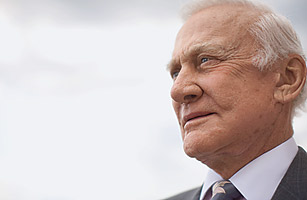
(3 of 4)
"The fact that we were in quarantine kept us connected to NASA," says Apollo 12's Alan Bean. "It was business, and that was good. It also gave us the chance to get the report written that we needed to write." Aldrin, who always had a powerful thirst, availed himself happily of the scotch the astronauts were provided during isolation and, when that ran out, took to filching some from the stash overseen by the lead doctor, who slept in the bedroom next to his.
The Apollo 15, 16 and 17 crews got no such slow re-entry time, and their return to the quotidian world was much more sudden. All of the men, however, had some hard adjusting to do. "The transition from 'astronaut preparing to accomplish the next big thing' to 'astronaut telling about the last big thing' did not come easily to me," Aldrin writes in his new book, Magnificent Desolation. The title is taken from the exquisite oxymoron he uttered when he first looked around himself on the lunar surface, but it aptly describes his early postmoon life as well. "What does a man do for an encore?" he asks.
For some, the encore was more of the same. Dick Gordon, who waited in orbit on Apollo 12 while his crewmates walked on the surface, wanted to return to the moon and get his boots dirty. Fred Haise, who was denied his chance to land when Apollo 13 was crippled, felt the same way. Haise was eventually tapped to command Apollo 18, and Gordon got 19 — but both missions were scrapped because of budget cuts. "On the way back, Pete, Dick and I talked about what we wanted to do," says Bean. "We all wanted to fly again."
Some did fly, others didn't, but nearly all felt at least some sense of drift. "People in wars have the same experience," says Mattingly. "They're in one world with one set of rules, and they step off an airplane and they're in another." NASA didn't help much. The agency exhaustively screened its candidate moonmen for emotional stability before clearing them for flight but kept a much more casual eye on them afterward. "I guess they figured we were big boys," says Lovell, a veteran of Apollo 8 and 13. Duke insists he didn't need a NASA nanny worrying over him anyway. "I was never a woe-is-me guy," he says.
But in failing to accept that woe sometimes was them, the space agency did its pilots a disservice, says psychologist and cultural anthropologist Lawrence Palinkas of the University of Southern California. Palinkas studies how people adapt to extreme environments and isolation, working with both NASA and groups planning polar expeditions. "What can make it hard for people like this is that they're so highly motivated and they wait so long for a mission," Palinkas says. "There can be a deep sense of loss once the goals have been accomplished, and there may be no adequate substitute."
Desk jobs in the shuttle program were available to many of the astronauts, but the new ship was a pickup truck compared with the glamorous Apollos. "Coming down from that Apollo high was hard," Duke concedes. Lovell had a more sudden moment of clarity. "I was looking at the design of the shuttle cockpit," he says, "and suddenly realized I was in the same room I was in years before when we were working on the F-4 [fighter]. I'd made a full circle." Not long after, he squared that circle and walked out the door.
For some, the next-best choice lay in politics, another high-stakes game, with the thrill of an election replacing the thrill of a liftoff — even if it was followed by the comparative drudgery of governing. Swigert ran successfully for Congress but died of cancer before he could be sworn in. Apollo 17's Harrison (Jack) Schmitt served a term as Senator from New Mexico, then lost his 1982 re-election bid to a candidate whose ads cheekily asked, "What on Earth has he done for you lately?"